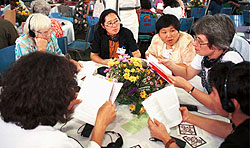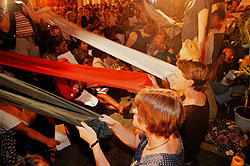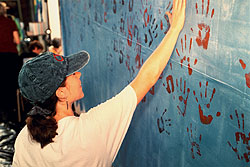* encouraged member churches to find ways to keep alive the goals of the Ecumenical Decade --
Churches in Solidarity with Women;
* authorized the preparation of "guidelines for inter-gender conduct" that incorporate the
understanding that violence against women is a sin;
* urged churches to provide opportunities for women to speak out about violence and abuse, where
"both the victims and perpetrators of violence can experience the power of repentance, forgiveness
and reconciliation";
* called for the development of just economic systems and structures in church and
society;
* denounced the sexual exploitation of women and children.
The women spoke clearly: we are celebrating the end of the Decade but we cannot accept being dismissed.
 |
The small group discussions were a key feature of the Decade Festival
Photo by Chris Black/WCC |
Participants celebrated the Decade programme's broad reach into grassroots church communities,
increased participation of women in church leadership and heightened awareness in both church and
society of women's strengths and struggles.
The pieces of cloth displayed at the Decade plenary symbolized the young women's network that was
formed during those ten years.
Photo by Chris Black/WCC
"The Decade opened things up for women around the world," said Karen Hessel, director of the
Justice for Women Programme of the National Council of the Churches of Christ in the USA.
Reports from 75 "Living Letters" team visits to 330
churches, 68 national councils and some 650 women's groups during the course of the Decade
revealed that "much education and advocacy happened", she said.

Click on the photo to order (ref. 7026-09)

